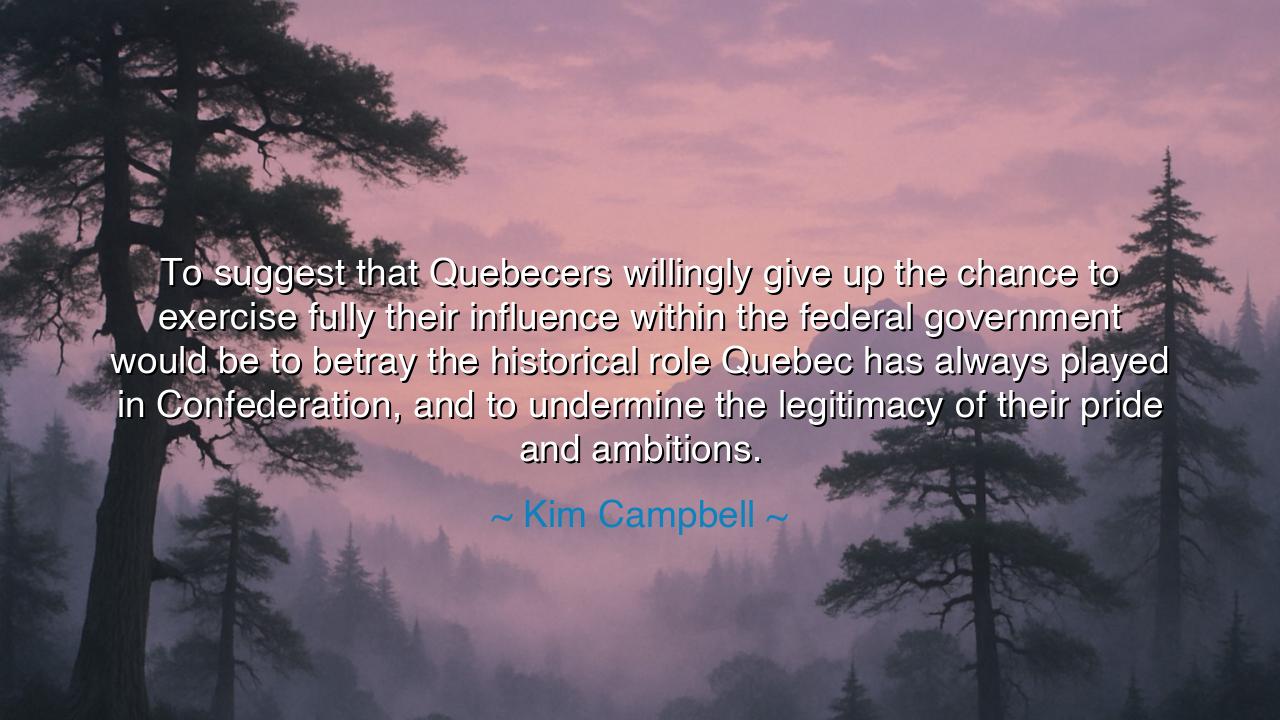
To suggest that Quebecers willingly give up the chance to
To suggest that Quebecers willingly give up the chance to exercise fully their influence within the federal government would be to betray the historical role Quebec has always played in Confederation, and to undermine the legitimacy of their pride and ambitions.






“To suggest that Quebecers willingly give up the chance to exercise fully their influence within the federal government would be to betray the historical role Quebec has always played in Confederation, and to undermine the legitimacy of their pride and ambitions.” Thus spoke Kim Campbell, Canada’s first female Prime Minister, whose words echo not only through the halls of Parliament, but through the very soul of the nation. In this declaration, she defends the dignity and destiny of Quebec, a province whose culture, language, and history have long stood as pillars of Canada’s identity. Her words are both a warning and a tribute — a reminder that to weaken Quebec’s place within the federation is to wound the heart of Canada itself, and to forget the sacred partnership upon which the country was built.
The origin of this quote lies in the continuing tension that has defined the Canadian Confederation since its birth in 1867. Quebec, with its French heritage and unique cultural spirit, has always wrestled with the question of belonging — whether to stand apart as an independent nation or to remain part of a broader Canada. Campbell, speaking in the midst of debates surrounding Quebec sovereignty, sought to remind her fellow citizens of history’s truth: that Quebec was not a reluctant member of Confederation, but one of its founding architects. The federal government was not meant to silence Quebec’s voice, but to amplify it — to make its vision part of the nation’s strength. To ask Quebec to give up that role, Campbell argued, would be to deny both its contribution and its right to shape the destiny of all Canadians.
Her words strike at a universal truth: that identity and unity are not enemies, but companions when guided by mutual respect. Quebec’s role in Canada has always been one of balance — preserving its own culture while enriching the fabric of the whole. Campbell’s phrase, “to betray the historical role Quebec has always played,” carries the weight of centuries. It recalls the early settlers of New France, who braved the wilderness not merely to survive, but to build a civilization rooted in faith, language, and endurance. It recalls the statesmen like George-Étienne Cartier, who helped shape Confederation itself — ensuring that Quebec would not be swallowed by the English majority, but would stand as a partner in the grand experiment of a bilingual, bicultural nation.
To “undermine the legitimacy of their pride and ambitions,” Campbell warns, is to misunderstand what true federalism means. Pride is not arrogance; it is the recognition of heritage. Ambition is not rebellion; it is the pursuit of purpose. Quebec’s demand to be heard, to lead, to shape policy, is not a threat to Canada — it is the very lifeblood of democracy. For when one voice is silenced, the chorus weakens; when one people’s pride is dismissed, the foundation of unity begins to crumble. Campbell saw that the strength of a federation lies not in uniformity, but in harmony — in the ability of diverse provinces and peoples to stand side by side without losing themselves.
History, as always, bears witness to her wisdom. Consider the referendum of 1995, when Quebec came within a breath of voting for independence. The nation stood upon the edge of division, trembling between two futures. In that moment, Canada was forced to confront what Campbell had foreseen — that neglecting the aspirations of one part of the nation endangers the whole. Yet, from that crisis emerged a renewed understanding: that unity cannot be demanded; it must be earned, day by day, through respect and inclusion. Her quote, though spoken earlier, foreshadowed that lesson — that no government can call itself whole while ignoring the pride of one of its greatest parts.
Her words also carry a deeper meaning, one that transcends borders. They speak to the eternal challenge of all nations built upon diversity — how to balance the power of the collective with the dignity of the individual. The temptation of central authority is to simplify, to demand sameness in the name of strength. But Campbell reminds us that true strength lies in complexity — in the willingness to honor distinct identities while still binding them in common cause. A government that forgets this truth risks not only disunity, but moral failure, for it betrays the promise of equality and mutual respect that defines democracy itself.
Therefore, O listener, let this teaching be etched into your heart: a nation’s greatness is not found in conformity, but in concord. To respect each people’s pride is to fortify the whole; to silence them is to invite decay. Whether you dwell in Quebec, Ontario, or any other land divided by language or lineage, remember this: unity is not forged by force, but by fellowship. Every voice must have its place in the chorus of the nation, or the music of liberty will fade.
So let us heed the wisdom of Kim Campbell. Let governments listen more than they command; let citizens cherish their neighbors’ differences as treasures, not threats. For the federal idea — that many can be one without ceasing to be themselves — is among humanity’s greatest experiments. And if we nurture it with humility and respect, then Quebec, and all the peoples of the world, may forever stand proud — free not only to speak, but to shape the destiny they share.






AAdministratorAdministrator
Welcome, honored guests. Please leave a comment, we will respond soon